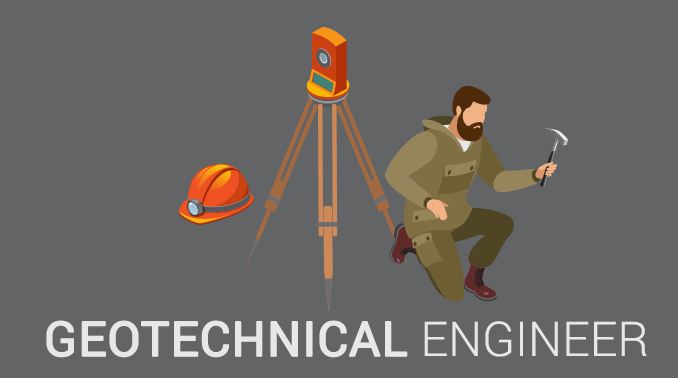The Only Guide for Geotheta
The Only Guide for Geotheta
Blog Article
Geotheta Can Be Fun For Anyone
Table of ContentsThe Only Guide for GeothetaSome Known Details About Geotheta All about GeothetaThe Single Strategy To Use For GeothetaGeotheta Fundamentals Explained

They conduct site examinations, accumulate samples, do research laboratory tests, and evaluate information to evaluate the suitability of the ground for building tasks - Consulting Engineer. Based upon their findings, geotechnical designers offer recommendations for foundation design, slope stability, preserving structures, and mitigation of geotechnical risks. They work together with various other specialists, such as engineers, architectural designers, and building and construction teams, to ensure that geotechnical considerations are integrated into the overall job style and application
By analyzing the actions and buildings of dirt and rock, they can determine possible geotechnical dangers such as landslides, dirt negotiation, or incline instability. Their proficiency helps prevent failures or mishaps that can jeopardize lives and building. Below are some thorough obligations and duties of a geotechnical designer: Site Investigation: Geotechnical engineers conduct website examinations to gather information on subsurface problems.
They interpret the information to comprehend the properties and behavior of the soil and rock, including their strength, permeability, compaction qualities, and groundwater conditions. Geotechnical Analysis and Style: Geotechnical engineers examine the information accumulated throughout website examinations to assess the stability and viability of the site for building jobs. They do geotechnical calculations and modeling to assess elements such as birthing capability, settlement, incline stability, side planet pressures, and groundwater flow.
Some Known Incorrect Statements About Geotheta
Structure Style: Geotechnical engineers play a vital role in making structures that can safely support the desired framework. They evaluate the dirt conditions and load demands to identify the ideal structure type, such as superficial foundations (e.g., grounds), deep foundations (e.g (https://yoomark.com/content/httpsgeothetacom)., piles), or specialized techniques like soil improvement. They consider aspects such as settlement limits, birthing ability, and soil-structure communication to establish ideal foundation designs
They assess building plans, screen site tasks, and perform field evaluations to verify that the layout referrals are complied with. If unexpected geotechnical issues emerge, they examine the circumstance and offer recommendations for removal or modifications to the design. Threat Evaluation and Reduction: Geotechnical designers evaluate geotechnical dangers and risks linked with the job site, such as landslides, liquefaction, or dirt erosion.

Collaboration and Interaction: Geotechnical engineers function carefully with other specialists included in a project, such as engineers, architectural engineers, and building and construction groups. Effective interaction and collaboration are necessary to integrate geotechnical considerations into the overall project design and building procedure. Geotechnical engineers provide technical experience, solution inquiries, and make sure that geotechnical demands are satisfied.
The Definitive Guide for Geotheta
Right here are some sorts of geotechnical engineers: Structure Engineer: Structure designers concentrate on making and examining foundations for structures. They evaluate the dirt problems, tons demands, and website qualities to figure out one of the most suitable structure type and style, such as shallow foundations, deep foundations, or specialized methods like heap structures.
They assess the elements influencing incline security, such as soil buildings, groundwater conditions, and incline geometry, and create techniques to avoid incline failures and minimize risks. Earthquake Designer: Quake engineers concentrate on analyzing and creating structures to endure seismic forces. They evaluate the seismic risk of a website, examine soil liquefaction possibility, and create seismic design standards to ensure the safety and security and durability of structures throughout quakes.
They perform area testing, accumulate samples, and analyze the accumulated information to define the soil residential properties, geologic formations, and groundwater conditions at a site. Geotechnical Instrumentation Engineer: Geotechnical instrumentation designers focus on tracking and measuring the habits of soil, rock, and frameworks. They mount and keep instrumentation systems that check aspects such as dirt negotiation, groundwater levels, incline activities, and architectural displacements to examine performance and offer early warnings of possible problems.
Unknown Facts About Geotheta
They carry out tests such as triaxial tests, combination examinations, straight shear tests, and leaks in the structure tests to collect information for geotechnical analysis and layout. Geosynthetics Engineer: Geosynthetics designers focus on the design and application of geosynthetic materials, such as geotextiles, geogrids, and geomembranes. They make use of these materials to improve soil stability, enhance inclines, give drainage solutions, and control disintegration.
They tend to be investigatory individuals, which indicates they're intellectual, introspective, and curious. They wonder, methodical, logical, analytical, and rational. A few of them are also social, meaning they're kind, generous, participating, person, caring, helpful, understanding, tactful, and friendly. Does this seem like you? Take our totally free career test to locate out if geotechnical engineer is one of your leading occupation matches.
In the office environment, geotechnical designers make use of specialized software program tools to execute estimations, produce designs, and assess information. They prepare reports, review project requirements, interact with clients and staff member, and coordinate task tasks. The office setup offers a conducive setting for research study, analysis, and cooperation with other specialists associated with the task.
Fascination About Geotheta
They often see project sites to perform website examinations, analyze geotechnical conditions, and gather information for evaluation. These brows through involve taking a trip to different areas, in some cases in remote or difficult terrains. Geotechnical engineers might perform soil tasting, conduct examinations, and screen building activities to guarantee that the geotechnical facets of the project are being executed correctly.
Geotechnical engineers likewise operate in specialized geotechnical research laboratories. In these facilities, they perform experiments, execute examinations on dirt and rock samples, and analyze the design buildings of the materials. Geotechnical research laboratory engineers work extensively in these environments, dealing with testing tools, running instruments, and videotaping information. They work together with various other laboratory staff to next page make sure precise and trusted testing results.
Report this page